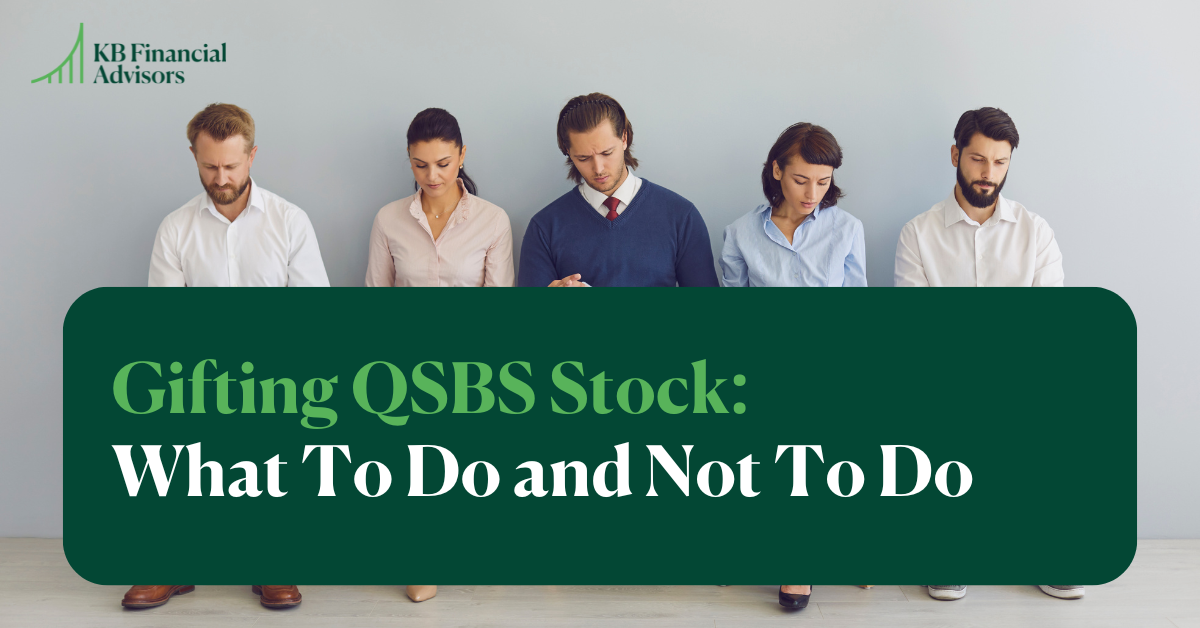If you’ve got Gifting QSBS stock, you probably know it can save you a fortune in taxes.
What you might not know is that gifting it can either multiply that benefit for your family… or blow it up completely.
Some moves can lock in the QSBS tax break and keep more money in your circle.
Others can cause the IRS to swoop in, tack on extra taxes, or erase the exclusion entirely.
Before you start moving shares to kids, spouses, or trusts, you need to know which is which.
Let’s start with the basics, then we’ll walk through gifting QSBS stock , what actually works, and how to decide if gifting makes sense for you.
Gifting Qualified Small Business Stock (QSBS) Basics
Before we get into what you should and shouldn’t do, it’s important to understand what really happens when you gift QSBS stock.
- When you give someone shares, the basis stays the same. There’s no step-up like there is when someone inherits assets. If you paid one dollar for the shares, the recipient’s basis is also one dollar.
The character of the stock stays the same too.

- If you bought those shares back in 2020 and they’re now long-term capital gains for you, they’ll be long-term capital gains for the person you gift them to.
- Even if the brokerage statement shows the transfer date, the “acquired date” for tax purposes is still when you originally bought them.
And finally, the underlying characteristics remain. If the stock qualifies for the QSBS exclusion in your hands, it will qualify in the recipient’s hands as well.
Those three points – basis, character, and QSBS status – form the foundation.
Everything else is about how you decide to transfer and who you give it to. Learn more about the impact on tech industry earnings in How The New Tax Bill Affects Tech Professionals.
Gifting QSBS Stock: What Not To Do
There are a few situations where gifting QSBS stock is either a bad idea or comes with risks you might not want to take.
1. Gifting when you want full control over the money
If you need the money for yourself, say to buy a second home or fund a personal project, gifting QSBS stock isn’t the move. Once you gift the shares, you’re giving up control. Even if the plan is for the recipient to hold or reinvest, you can’t dictate that once it’s out of your hands.
2. Gifting to a spouse
This one is murky. In community property states, assets acquired during marriage are generally 50/50. The One Big Beautiful Bill legislation tried to clarify the rules for married couples, but IRS guidance and court cases don’t always match. The general consensus from the IRS is that they don’t want you claiming the exclusion twice for married couples when gifting QSBS stock.
At KB Financial Advisors, we only move forward with this strategy if there’s a written opinion from a tax attorney. We work with an attorney who can provide that, but without it, this is not a safe assumption.
3. Gifting when inheritance is imminent
If someone is nearing the end of life, you don’t need to gift before death. Transfers at death retain QSBS eligibility and also receive a step-up in basis to fair market value. You can pass them to multiple beneficiaries, and they keep both the tax break and the higher basis.
4. Gifting over the lifetime exclusion
In 2025, the lifetime gifting and estate tax exclusion is $13.99 million. The One Big Beautiful Bill Act will raise that to $15 million and index it for inflation, but going over still triggers gift tax. The point of gifting QSBS stock is to avoid taxes, so using it in a way that creates a new tax bill defeats the purpose..
5. Creating multiple trusts for the same beneficiary
Some people try to split gifts into several trusts for the same person to multiply the benefit. The IRS has been clear in court that this doesn’t work. They see through it and treat them as one trust.
6. Gifting directly to individuals
It’s legal, but risky. You lose all control. If the recipient is an adult child going through a divorce or financial trouble, creditors or ex-spouses could claim part of the stock or proceeds. Without a trust, there are no safeguards.
7. Ignoring the kiddie tax
If you gift stock directly to a child and it’s sold, the gain can be taxed at the parent’s rate under kiddie tax rules. That means you’re not really saving much in taxes.
Gifting QSBS Stock: What To Do Instead
Now that we’ve covered the don’ts, here’s what actually works well in most cases.
1. Use your annual exclusion strategically
For 2025, the annual exclusion is $19,000 per recipient. You can gift up to that amount without touching your lifetime exclusion. Married couples can effectively double it by giving jointly.
2. Time gifts when the valuation is low
If your QSBS shares are still early in their growth – maybe worth just a few dollars a share – gifting them now uses less of your exclusion. That way, all the future growth happens in the recipient’s hands, not yours.
3. Gift to a non-grantor irrevocable trust
This can help keep the stock protected from creditors and divorce while still allowing you to set rules for how it’s managed or distributed. If you stay under the annual exclusion, you won’t even need to file a gift tax return.
4. Keep lifetime exclusion in mind
If you gift more than the annual limit, you’ll need to file IRS Form 709. That’s fine if it’s part of a bigger strategy, but keep track of how much you’ve used so you don’t get an unexpected gift tax bill.
5. Allow for growth
A trust structure lets the gifted shares grow in value outside of your estate. If the shares take off in value later, that growth is shielded from estate taxes in your hands.
Putting It All Together
Gifting QSBS isn’t just about generosity.
It’s a tax and estate planning tool that can move future gains out of your estate, protect assets, and set up heirs or trusts for long-term benefit.
But it has to be done with precision.
Get the basics right – basis, character, QSBS status – and avoid the pitfalls like gifting to a spouse without a legal opinion, overusing your lifetime exclusion, or losing control to creditors.
Then focus on the strategic moves that really work: annual exclusion gifting, timing transfers when valuations are low, and using trusts that protect and grow the value.
If you’re thinking about gifting QSBS stock, we can help you decide whether it makes sense, how to structure it, and how to avoid the mistakes that cost people millions in taxes and missed opportunities.
You can book a time with us here at Kb Financial Advisors, and we’ll walk through your options step by step.
Otherwise, check out our popular blog post on How QSBS Works. We think you’ll find it useful.
Until next time.




